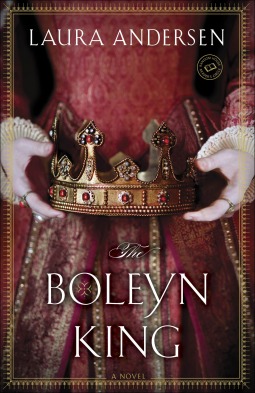
For some reason I have always been fascinated with King Henry XIII and the whole Anne Boleyn story, so when I saw the library recommendation for this book, I knew that I had to read it. What was intriguing about this piece is the "What If?" scenario presented. What if Anne Boleyn's son had survived at birth and she was never executed for her adulterous crimes? Would the outcome still be the same with Elizabeth being crowned Queen in her lifetime?
This novel is seen through the eyes of several different individuals, but one seemed to stand out above the rest. Elizabeth, as written by Laura Andersen, was very well done. She had the independence and hardness that I have come to love about her. Also, her wit is still in tact within this piece, which is equally important. However, I also enjoyed the way that William seemed to be a polar opposite of Elizabeth with his love of grandeur and free spirit. Andersen tried to encompass Henry XIII lust for life within William, but I would have like to see just a little more wit and little less anger for him. Andersen does create a character that seems to be the peace keeper of the bunch. Dominic is the son of a prior traitor, but was brought into the Tudor household and trust by Henry XIII. William considers him to be more than a friend, giving a title for his service as a soldier in the king's army. I enjoyed the parts of the story through his eyes, but they read like a young man's diary in which he was writing daily about the young woman he was pining for but could not have.
The only character I don't know that I was entirely sold on was that of Minuette and unfortunately, the majority of the story is told through her eyes. She is the daughter of Anne Boleyn's servant that was born on the same night that William was and is brought up within the Tudor household. Looked upon as family, she ends up as Elizabeth's head servant and ends up in a love triangle with William and Dominic. Andersen, however, does not really do a good job of explaining why she is so sexually sought after. Some of the situations and decisions that Minuette made throughout the plot seemed a little unbelievable and that hurt the plot for me.
Andersen also added in a murder mystery to the story, which is the primary focus of her piece. Minuette's roommate appears to have committed suicide, but it turns out she was actually murdered. It is centered on a secret that could possibly take away William's birthright to be king. Without this part of the plot, I am not certain that the piece would have help my interest. It helped with establishing a genuine conflict and climax for her novel, but parts of it seemed a little farfetched with respect to Minuette's role. I don't want to put any spoilers in her, so I am going to leave this intentionally a little vague. However, I will say that apart from that there were some nice, unexpected twists that I did enjoy as evidence was brought to light.
Overall, I thought that this was a very quick and rather interesting read, especially with the added murder mystery. If it had been just another retelling of the time period, it would have been extremely boring, but Andersen did a rather good job of keeping me an active reader. There are a few historical inaccuracies along with some small editing errors, but they don't seem to deter from the story telling that Andersen is able to accomplish. It may have roused my curiosity just enough, that I may need to eventually read the other books in the series.
If you enjoy historical fiction that does not keep to the exact confines of the period and incorporates some things that may be historically inaccurate, then this book would be a good choice. However, if you are a stickler for details and those inaccuracies would keep you from enjoying the book, then I would suggest skipping this one.
Rating: 3.5 out of 4
This book was borrowed from my local library; I was not asked to do a review of this book.
Image was taken from Good Reads.